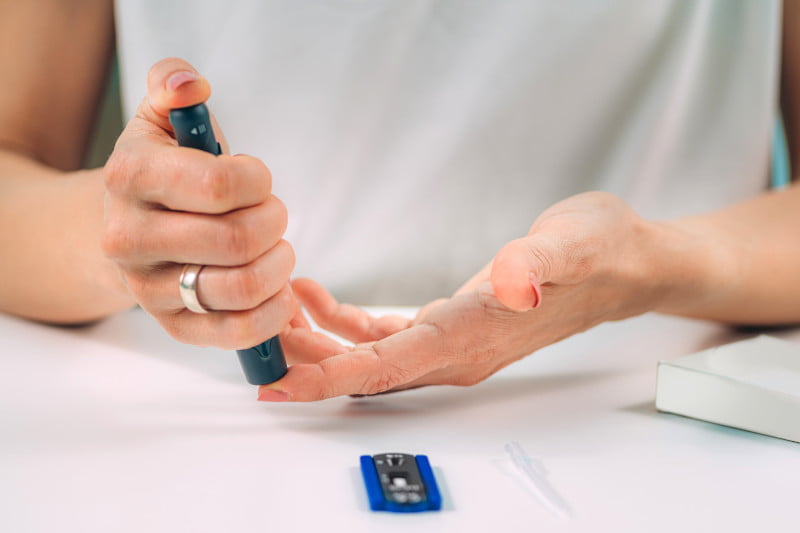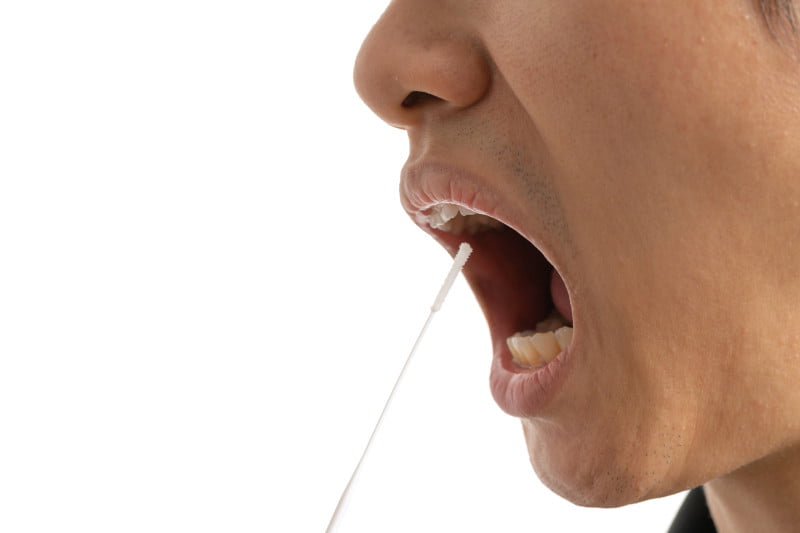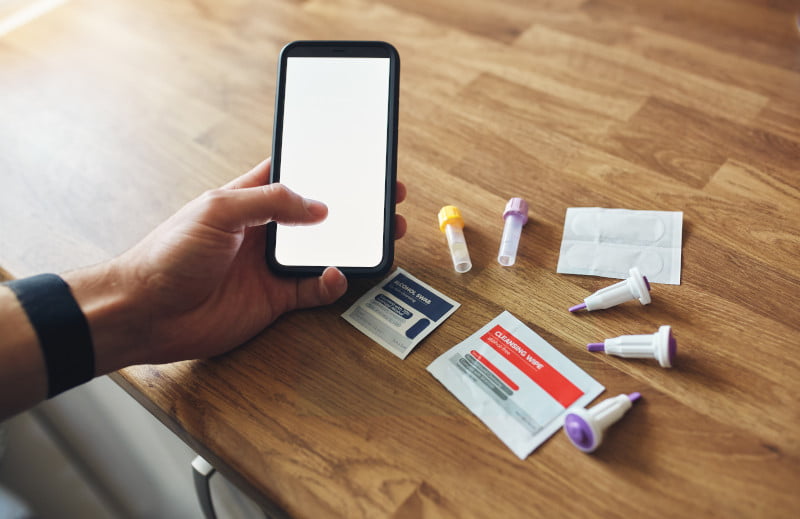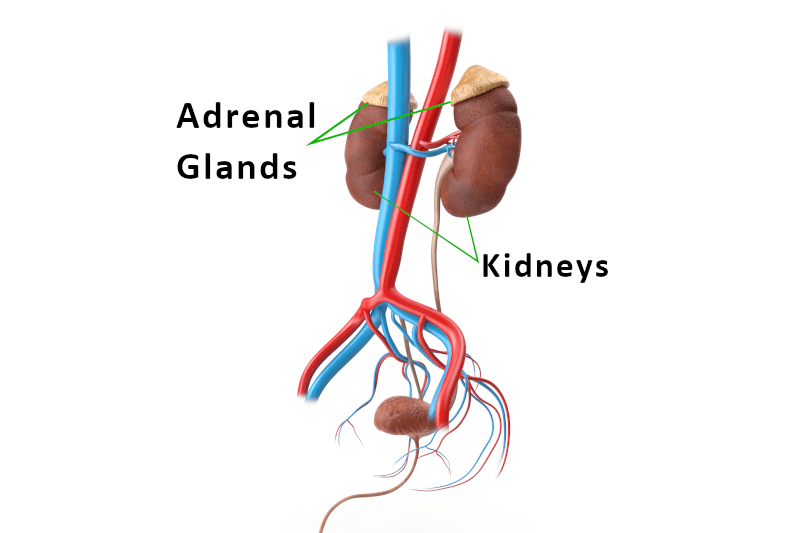There are several symptoms of low testosterone that you may be unaware of. You can test your testosterone levels with your doctor's help, but you can also do it at home!
You can pick up a testosterone test kit, perform the test at home, and then send your samples to the relevant laboratory.
This quick guide will show you how to test testosterone levels at home properly.
Who Needs to Check Their Testosterone Levels?
Testosterone naturally begins to drop off in men once they hit 30, but it can progress into hypogonadism(1) in severe cases.
Test levels for women also go down once they become menopausal(2). Apart from age, low hormone levels can also be due to a pituitary gland disorder or obesity.


Refer to this list of low-test symptoms below. If you're experiencing several symptoms at once, you may want to get your test levels checked.
Low testosterone has several symptoms, such as:
- Sudden and unexplained weight gain
- Diminished libido and reduced sexual satisfaction
- Difficulty building and maintaining muscle
- Reduced endurance and sudden bouts of fatigue
- Concentration difficulties
- Poor mood and increased irritability
How to Test Testosterone Levels at Home
If you don't want to leave the comfort of your home to check your test levels, you can pick up a home testosterone kit.
Several reputable manufacturers create testosterone test kits that you can order for home use.
Note that you'll still need to get your test results interpreted by a doctor after taking the test.
How Do Testosterone Tests Work?
There are TWO general categories of testosterone test kits. The first kind requires a blood sample, while the second requires saliva.
Depending on the complexity of your testing kit, it will be able to detect only your free testosterone level or both your free and total testosterone levels.
Testosterone Blood Test
There are two different forms of test kits that involve blood testing. The first requires pricking your finger with a sharp tool.


On a strip of testing paper, you’ll then let collect a small amount of blood until it dries.
The second will require more blood. Using a lancet, you’ll need to draw a few drops of blood and let it drip into a test tube.
Testosterone Saliva Test
Using the tube provided, deposit a saliva sample by using a swab and seal it within the tube. The EverlyWell testosterone test kit is an example of a saliva-based test.


The main benefit of this test type is that saliva samples are easier to collect and less painful.
Regardless of which type of testing kit you pick up, you'll need to mail your test results to a certified laboratory so they can perform their analysis.
How to Choose the Right Home Testosterone Test?
Outside of affordability, you should look into how detailed your test kit's results will be and whether the kit manufacturers work with an accredited laboratory.


Choosing a testing kit partnered with a CLIA-certified (Clinical Laboratory Improvement Amendments) lab is advisable. This will help ensure your results are as accurate as possible.
More complex test kits go further than testosterone levels and could also check your Albumin, Luteinizing Hormone, and SHBG levels.
How Much Do Testosterone Tests Cost & Are Testosterone Tests Accurate?
Though they're complex, a home testosterone test shouldn't be expensive! A test kit will generally cost between $45-$220, depending on how much detail you want in your results.
Some testing kit manufacturers provide the option to pay using either a Flexible Spending Account or Health Savings Account, so you don't have to pay out-of-pocket for the test.
The blood-based testosterone tests are generally more accurate than saliva-based tests, but the difference lies mainly in personal preference.
Will You Need to Do Anything to Prepare Yourself for the Test?
There isn't anything special you need to do before taking an at-home testosterone test but remember to read the manufacturer's label carefully.


Depending on the test kit, you'll likely have to fast and stop drinking any liquids but water for about 8-12 hours before the test. The exact amount of time will depend on your kit.
Are There Any Risks to the Test?
Taking a blood test to check your testosterone levels doesn't carry any inherent risk, nor does taking a saliva test.
Before proceeding with the test, ensure that every component of the provided test kit is clean or in a sealed container to reduce the possibility of getting faulty results.
How to Interpret Your Results?
You'll need to send your test results to a doctor to interpret them. You'll get a better explanation for your blood or saliva tests after a few rounds of laboratory testing.
Fortunately, most testing kit manufacturers include a consultation and interpretation of your results via email or a video conference.
What Is a Normal Testosterone Level?
If your body's testosterone production is normal, you should be fairly healthy, regardless of your lifestyle choices and habits.
However, normal testosterone levels differ between men and women since men naturally produce more testosterone(3) than women.


It's common for test levels to drop with age, which is why some men take testosterone therapy once they've hit middle age or above.
Hormone replacement therapy is more useful for men with naturally low levels of testosterone since it will have a more pronounced effect and will help them regain their healthy test levels.
However, it's still worth taking for aging men who want to feel the vigor of their youth again.
Normal T-Levels for Men
As one of the most important hormones for men, the normal range of total testosterone levels is relatively high.


Men should have test levels within 300-1000 ng/dL (nanograms per deciliter). Adolescent males have a slightly higher range of 300-1200 ng/dL.
Your results may differ depending on which laboratory handled your blood tests.
Normal T-Levels for Women
Despite being known more as the male sex hormone, women’s bodies also produce testosterone! An adult female's test levels should be within the range of 15-70 ng/dL.


It's important to note that female test levels will also be slightly higher during adolescence but will eventually even out once they reach adulthood.
When Should You See Your Doctor?
If your testosterone deficiency becomes too severe, you'll eventually need to resort to professional medical advice.
If your test results show low testosterone and your symptoms continue, it's time to set an appointment with your doctor.
They can help identify the source of your symptoms and whether any lifestyle changes or testosterone replacement therapy (TRT) is required.
What Is Testosterone and What Is Its Role in Your Body?
Testosterone is the primary male sex hormone that determines several secondary sexual characteristics in both men and women.
Both men and women rely on their adrenal glands to produce testosterone, but the majority of testosterone production happens in the testes for men.


Your testosterone levels can be affected by the amount of sex hormone-binding globulin (SHBG) that your body produces.
SHBG is a protein that attaches itself to vital hormones, like testosterone and estradiol, and is predominantly produced in the liver.
Here are some of the things this vital hormone does for men:
- It helps develop body hair and facial hair during puberty
- It helps produce red blood cells
- Regulates the libido
- Increases skeletal muscle and muscle mass
Frequently Asked Questions (FAQs)
Learn more about testosterone testing with these FAQs:
How Do I Know if My Testosterone Is Low?
The symptoms of low testosterone differ slightly between men and women. Still, there are a few common signs, like increased fatigue, a loss of bone density and general weakness of the muscles, and a diminished libido and poor mood. Men may experience erectile dysfunction, and women may experience vaginal dryness.
What's the Difference Between a Testosterone Blood Test and a Saliva Test?
Of the two different kinds of testosterone testing kits, saliva testing is quicker and more comfortable for patients who don't want to draw their blood. However, saliva may not give accurate or reproducible results. A blood test can get more accurate test results at the cost of additional discomfort.
How to Choose the Best Home Testosterone Kit?
There are a few determining factors for the best testing kit: It should be competitively priced, accurate, and reliable, plus include a review of your results by a medical professional. Whether it asks for blood or saliva isn't too important as that's more a matter of personal comfort.
What if My Test Results Indicate a Problem?
If your results show an issue, don't move toward further testing yet. Speak with your doctor to identify the source of any problems. It could result from the medications you're taking due to lifestyle issues like an unhealthy diet or a common side effect of age. The "problem" may not be a medical condition at all.
What Happens During the Test?
Whether your test requires blood or saliva, you should take the sample early in the morning for the most accurate results. It's common for your testosterone level to go down throughout the day, so take the test from 7-10 AM or 30 minutes after you first wake up. Remember to dry your sample before mailing it to be interpreted.
How Often Should I Retest My Testosterone?
After conducting one at-home test, wait for the results to come in. If you want to get tested again, you'll have to wait about 2 to 3 more weeks before repeating the test. Your hormone levels may change within the day, so allowing this time gap will help create reproducible results. Ask your doctor for advice about consistently low test levels.
Conclusion: Can You Check Testosterone Levels at Home?
With the help of an at-home testosterone test kit, checking your test levels is quick and easy. Just remember to send your test results to be interpreted by medical professionals.
You can naturally raise your testosterone levels by following an exercise regimen and eating a nutritious and balanced diet. Whether you've given blood samples or a saliva sample, remember to keep your hormone levels in check!


- Dandona, P, and M T Rosenberg. “A practical guide to male hypogonadism in the primary care setting.” International journal of clinical practice vol. 64,6 (2010): 682-96. doi:10.1111/j.1742-1241.2010.02355.x↩
- Johansen, Nora et al. “The role of testosterone in menopausal hormone treatment. What is the evidence?.” Acta obstetricia et gynecologica Scandinavica vol. 99,8 (2020): 966-969. doi:10.1111/aogs.13819↩
- Handelsman, David J et al. “Circulating Testosterone as the Hormonal Basis of Sex Differences in Athletic Performance.” Endocrine reviews vol. 39,5 (2018): 803-829. doi:10.1210/er.2018-00020↩
